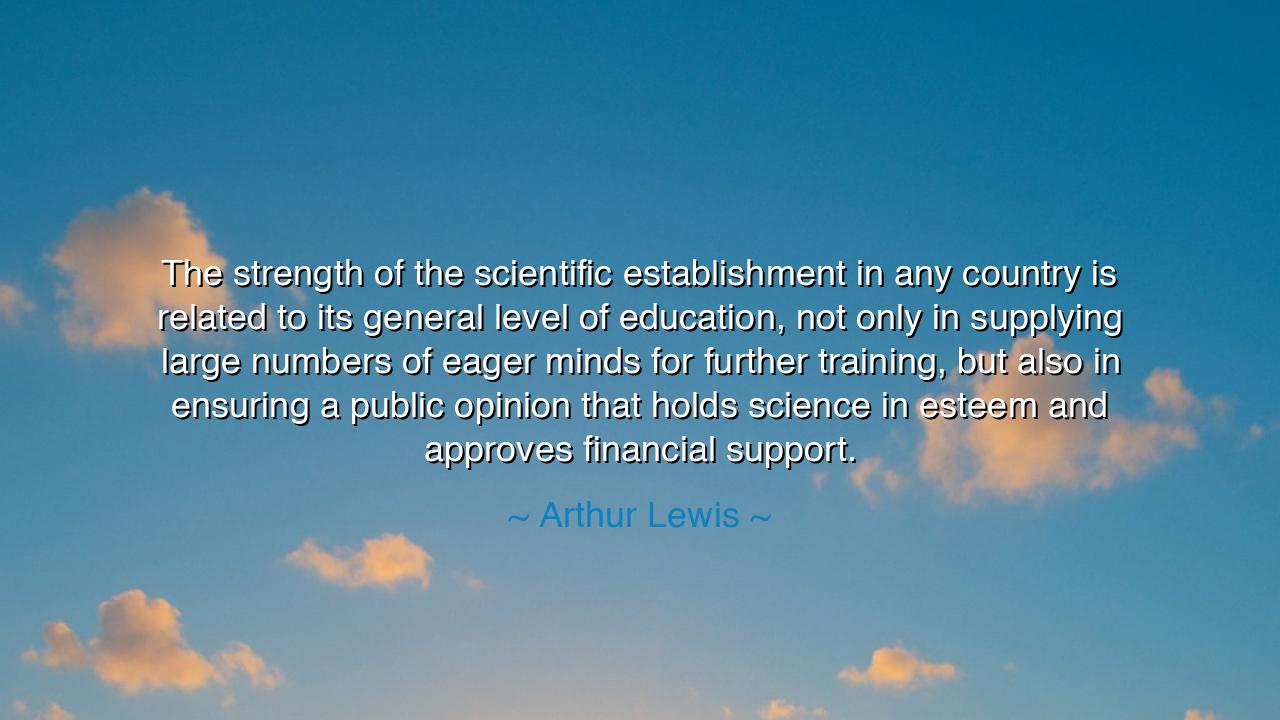
The strength of the scientific establishment in any country is
The strength of the scientific establishment in any country is related to its general level of education, not only in supplying large numbers of eager minds for further training, but also in ensuring a public opinion that holds science in esteem and approves financial support.






When Sir Arthur Lewis, the Nobel laureate in economics, declared, “The strength of the scientific establishment in any country is related to its general level of education, not only in supplying large numbers of eager minds for further training, but also in ensuring a public opinion that holds science in esteem and approves financial support,” he was not merely speaking of laboratories and universities — he was speaking of civilization itself. His words illuminate an eternal principle: that knowledge is the true foundation of a nation’s power, and that the destiny of a people is determined not by its wealth or its armies, but by the minds it cultivates and the values it honors.
The origin of this quote lies in the mind of a man who understood the intersection between learning and progress. Born in Saint Lucia and rising to become one of the great thinkers of the 20th century, Arthur Lewis devoted his life to understanding how nations grow — not only economically, but intellectually. His work revealed that education is not a luxury, but the lifeblood of national advancement. When he spoke of the “strength of the scientific establishment,” he was describing more than scholars or institutions; he was describing the spiritual and intellectual vigor of a people who believe in the transformative power of reason, discovery, and truth.
Lewis reminds us that science does not flourish in isolation. It cannot thrive in a land where ignorance is tolerated, nor can it grow in a society that views knowledge with suspicion. The advancement of science depends not only on the few who study it, but on the many who believe in it, who defend it, and who fund it. When he wrote of “a public opinion that holds science in esteem,” he was pointing to the sacred duty of citizens to protect and revere the pursuit of truth. A nation that celebrates its inventors, teachers, and researchers builds temples of progress far greater than any monument of stone.
History itself bears witness to this truth. In the 15th century, when Florence embraced education and the scientific spirit, the Renaissance was born — an era that revived art, mathematics, and philosophy. The city became a beacon of human potential because it invested not merely in artisans, but in the education of the people. Centuries later, nations like Japan, devastated by war, rebuilt themselves not with weapons, but with schools, laboratories, and the belief that every child’s mind was a national treasure. These societies rose not through conquest, but through commitment to learning — and from their devotion to education emerged technologies and discoveries that transformed the world.
Yet Lewis also warns us of a deeper truth: that when the public loses faith in science, when education is neglected or dismissed, decline follows. History again offers examples. When ancient Alexandria’s great library burned, it was not only scrolls that were lost — it was centuries of wisdom, the collective mind of a civilization. The fall of that light plunged generations into darkness. Likewise, in any age, when leaders defund schools, when societies mock knowledge or silence curiosity, they do not merely slow progress — they undo it. The decay of education is the decay of hope itself.
What Lewis understood is that education and science form a covenant — a partnership between the thinker and the citizen, between the visionary and the voter. For every scientist who strives to uncover nature’s laws, there must be a society that believes in the value of that search. For every student eager to learn, there must be a system that nourishes rather than restrains the mind. The future belongs not to those who have the most gold, but to those who have the most understanding — for wisdom multiplies, while wealth withers.
The lesson of Lewis’s words is as urgent now as it was then: honor education as the foundation of freedom, and revere science as the guardian of truth. Teach your children not only to memorize, but to question. Support those who seek knowledge, not because their discoveries will yield profit, but because they will yield progress. Let every citizen become a patron of learning, for in doing so, they secure the light that will guide generations to come.
And so, let us remember Arthur Lewis’s wisdom as a timeless decree: The strength of a nation is measured by the brightness of its minds. Build schools, not walls; encourage questions, not silence; and hold in esteem those who dare to uncover the mysteries of the world. For when a society educates its people and cherishes its thinkers, it does not merely survive the ages — it transcends them, leaving behind not monuments of stone, but monuments of mind and spirit that endure forever.






AAdministratorAdministrator
Welcome, honored guests. Please leave a comment, we will respond soon